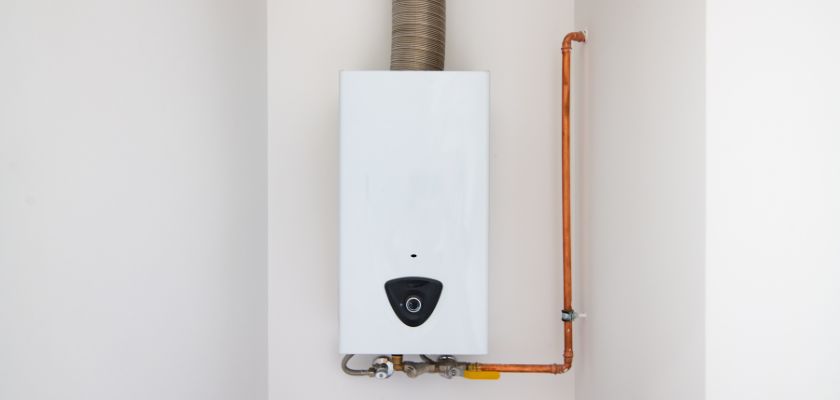The quest for energy efficiency and on-demand hot water has led many homeowners to consider tankless water heaters. Unlike traditional tank water heaters, which store and constantly heat a large volume of water, tankless models heat water only when needed. This shift in technology offers several benefits and some considerations to keep in mind. In this article, we’ll explore the advantages of tankless water heaters and provide a comparative analysis with traditional tank water heaters. We’ll also touch on the specifics of electric water heater installation guides and highlight important considerations for water heater installation in North Richland Hills.
Table Of Contents
Understanding Tankless Water Heaters

Tankless water heaters, also known as on-demand or instantaneous water heaters, are designed to provide hot water only when it is needed, eliminating the need for a storage tank.
How Do Tankless Water Heaters Work?
- Heating Mechanism: When a hot water tap is turned on, cold water travels through a pipe into the unit. A gas burner or an electric element heats the water, providing a continuous supply of hot water.
- Energy Efficiency: By heating water only when necessary, tankless water heaters can be more energy-efficient, especially in households with lower hot water demands.
- Compact Design: These units are typically more compact than traditional tank water heaters, making them ideal for homes with limited space.
Pros of Tankless Water Heaters
- Endless Hot Water: Since tankless water heaters heat water on demand, there is no risk of running out of hot water, making them ideal for larger families or high-demand situations.
- Longer Lifespan: Tankless water heaters generally have a longer lifespan compared to tank models, often lasting up to 20 years or more with proper maintenance.
- Space-Saving: The compact design of tankless units allows for installation in smaller spaces, providing more flexibility in placement.
Cons of Tankless Water Heaters
- Higher Initial Cost: The upfront cost for purchasing and installing a tankless water heater is generally higher than that of a traditional tank model.
- Complex Installation: Installation may require upgrades to electrical systems or gas lines, and sometimes venting modifications, making professional installation crucial. For detailed installation steps, refer to an electric water heater installation guide or consult a local professional.
- Inconsistent Temperature: In some cases, if multiple hot water sources are in use simultaneously, there may be a fluctuation in water temperature.
Comparing Tankless and Traditional Tank Water Heaters
| Feature | Tankless Water Heaters | Traditional Tank Water Heaters |
|---|---|---|
| Installation Cost | Higher, may require upgrades | Lower, simpler installation |
| Energy Efficiency | More efficient, no standby heat loss | Less efficient, standby heat loss occurs |
| Space Requirement | Compact, space-saving | Requires significant space for tank |
| Lifespan | Longer, up to 20+ years | Shorter, around 10-15 years |
| Hot Water Supply | Endless, on-demand | Limited by tank capacity |
| Maintenance Needs | Less frequent, monitor for mineral buildup | Regular flushing required to remove sediment |
When choosing between tankless and traditional tank water heaters, it’s important to consider the specific needs of your household and the benefits and drawbacks of each type.
Energy Efficiency and Operating Costs
- Tank Water Heaters: These units maintain a large volume of water at a constant temperature, which can lead to energy loss over time, known as standby heat loss.
- Tankless Water Heaters: By heating water only as needed, tankless units reduce standby energy loss, making them more energy-efficient, particularly for homes with lower daily hot water use.
Installation and Space Considerations
- Tank Water Heaters: Typically easier and less costly to install, but they require a significant amount of space for the tank itself.
- Tankless Water Heaters: Installation can be more complex and costly, especially if upgrades to electrical systems or gas lines are needed. However, their compact size can save valuable space, which is particularly beneficial for smaller homes.
Lifespan and Maintenance
- Tank Water Heaters: Generally have a lifespan of 10-15 years. Regular maintenance, such as flushing the tank to remove sediment buildup, can extend the unit’s life.
- Tankless Water Heaters: Often last 20 years or more. They require less frequent maintenance, although it’s important to regularly check for mineral buildup, particularly in areas with hard water.
Considerations for Water Heater Installation in North Richland Hills
Choosing the right water heater involves understanding the local climate, utility rates, and specific installation requirements. For residents of North Richland Hills, these factors are especially pertinent.
Local Climate and Water Demand
The mild climate in North Richland Hills may reduce the overall demand for hot water, making tankless water heaters a more efficient choice for some households. However, larger families or homes with high hot water usage may still benefit from the consistent supply provided by traditional tank water heaters.
Utility Rates and Rebates
North Richland Hills residents should consider the cost of electricity and natural gas when selecting a water heater. Tankless water heaters may offer long-term savings on utility bills, particularly if there are local rebates or incentives for energy-efficient appliances.
Professional Installation and Local Codes
Whether opting for a tankless or traditional water heater, it’s crucial to consult a local professional for installation. The water heater installation North Richland Hills professionals can ensure compliance with local building codes and optimize the unit’s performance. Using an electric water heater installation guide can be helpful, but professional guidance is recommended for more complex installations.
Final Wording
The choice between tankless and traditional tank water heaters depends on your household’s specific needs and preferences. Tankless water heaters offer the benefit of endless hot water and higher energy efficiency, making them an excellent choice for those looking to reduce energy consumption. However, the higher initial costs and potential installation complexities are factors to consider. For residents of North Richland Hills, consulting a professional for a water heater installation North Richland Hills is recommended to ensure proper installation and compliance with local codes. Whether you opt for a tankless model or a traditional tank, the key is to choose a system that meets your household’s hot water demands and fits within your budget.
FAQ’s
A tankless water heater heats water on demand, meaning it only heats water when you turn on the tap. As long as the unit’s capacity isn’t exceeded, it can provide an endless supply of hot water, unlike tank water heaters which are limited by the tank’s storage capacity.
What are the main factors to consider when choosing between a tankless and a tank water heater?
Key factors include your household’s hot water usage, energy efficiency, installation space, upfront and long-term costs, and the climate in your area. For example, a tankless water heater may be more efficient for smaller households, while larger families might benefit from the consistent hot water supply of a tank water heater.
Are tankless water heaters more difficult to install than tank water heaters?
Yes, tankless water heaters often require more complex installation, which may include upgrades to electrical systems, gas lines, and venting. It’s advisable to consult an electric water heater installation guide or hire a professional, especially for water heater installation in North Richland Hills, to ensure proper setup.
Do tankless water heaters require more maintenance than traditional tank water heaters?
Tankless water heaters generally require less frequent maintenance, but they do need regular checks for mineral buildup, especially in areas with hard water. Tank water heaters require regular flushing to remove sediment buildup, which can affect efficiency and lifespan.
Can a tankless water heater handle multiple simultaneous hot water demands?
Tankless water heaters can provide continuous hot water, but their capacity can be limited if multiple hot water sources are used at once (e.g., showers, dishwashers, and washing machines). It’s important to select a unit with a flow rate that matches your household’s needs.







